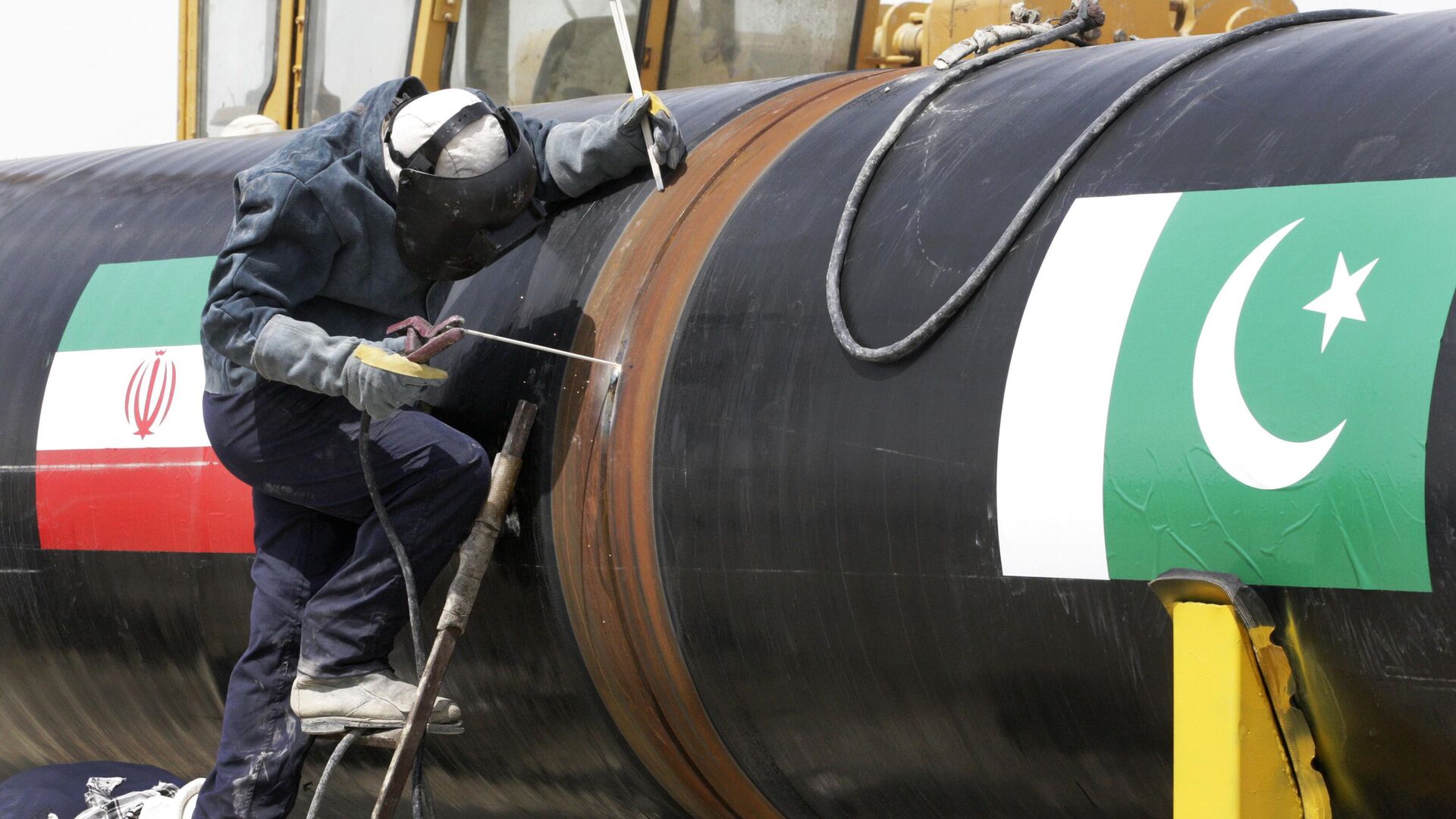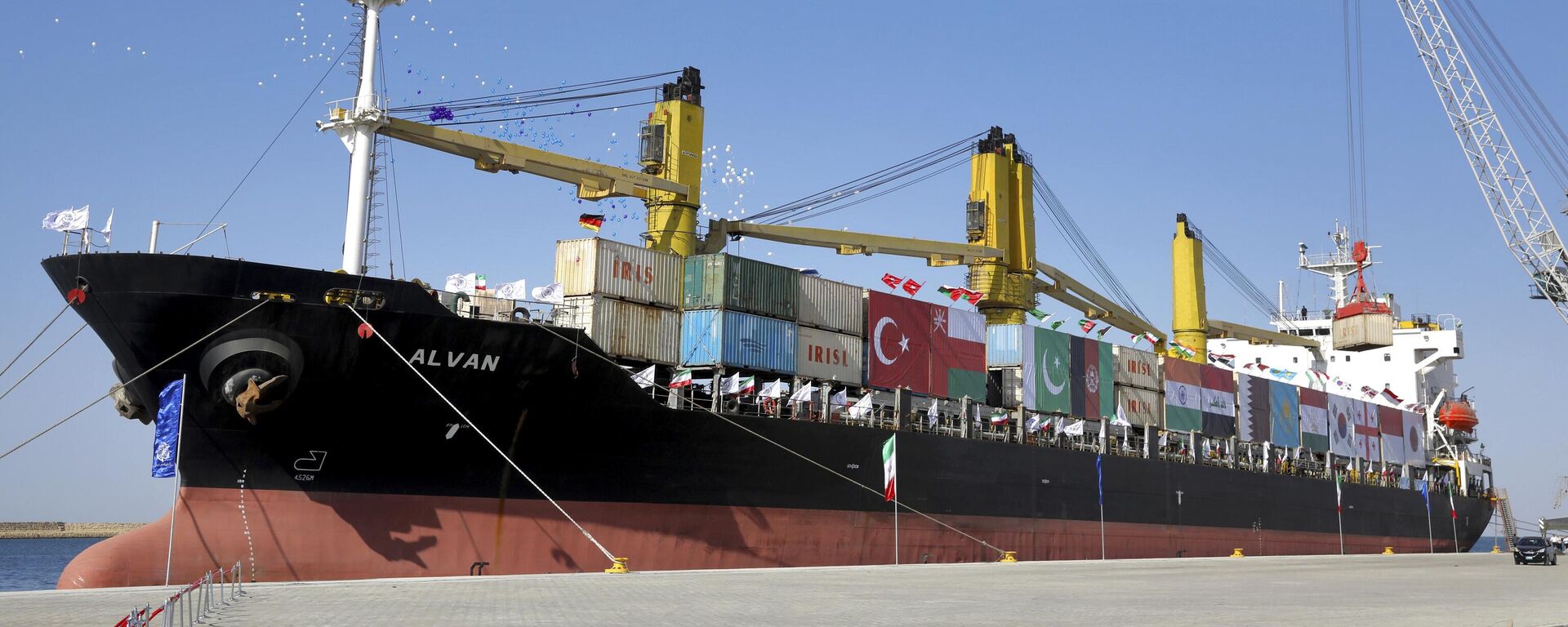https://sputniknews.in/20240501/overcoming-economic-challenges-is-behind-pakistan--irans-decision-to-jointly-fight-terrorism-7265385.html
Overcoming Economic Challenges Is Behind Pakistan & Iran's Decision to Jointly Fight Terrorism
Overcoming Economic Challenges Is Behind Pakistan & Iran's Decision to Jointly Fight Terrorism
Sputnik India
Iran and Pakistan's recent joint statement on joining hands to tackle terrorism in the region is based on the premise of strengthening economic ties between the two countries, a geopolitical pundit has said.
2024-05-01T19:50+0530
2024-05-01T19:50+0530
2024-05-01T19:50+0530
sputnik opinion
terrorism
ebrahim raisi
shehbaz sharif
pakistan
iran
tehran
taliban
islamabad
kabul
https://cdn1.img.sputniknews.in/img/07e7/0b/11/5453218_0:160:3072:1888_1920x0_80_0_0_1893ca38932f5fbf6cc5720684191588.jpg
Iran and Pakistan's recent joint statement on joining hands to tackle terrorism in the region is based on the premise of strengthening economic ties between the two countries, a geopolitical pundit has said.The remarks of Anant Mishra, a visiting fellow at the International Centre for Policing and Security of the University of South Wales, came in the aftermath of Iranian President Ebrahim Raisi's visit to Islamabad late last month.Following the talks between Raisi and Pakistan Prime Minister Shehbaz Sharif, the two Asian Islamic nations came out with a joint statement in which they pledged to launch joint counter-terrorism operations.Both Tehran and Islamabad have accused Afghanistan of sheltering terrorists that have carried out their anti-Pakistan and anti-Iranian activities from their soil.In this light, Mishra noted that the joint initiative on counterterrorism could have been a front for another confidence-building mechanism.Tehran, Islamabad's Deep-Rooted Economic Reliance on Each OtherBoth the Pakistani and Iranian Foreign Ministers, last year had agreed to increase official bilateral trade from roughly $2 billion to $5 billion. Raisi raised the stakes even further by arguing in favor of trade worth $10 billion between the neighboring states in the next couple of years.In a nutshell, the joint statement on the counter-terrorism initiative reflects the need to strengthen ties on the economic front, and perhaps develop greater economic interdependence, which could enable them to find long-term sustainable solutions to border instability issues.Iran’s Balancing Act Vis-à-Vis Pakistan and AfghanistanThe expert on Iran-Pakistan relations stated that it is important to understand the fact that Iran's policy toward the Afghan Taliban* is heavily influenced by geopolitical considerations, and Tehran carries/undertakes various considerations before interacting with the Taliban.He asserted that it would not be incorrect to state that Iran remains cautious about the potential influence of other regional powers in Afghanistan and it continues to maintain balanced relations/engagement with its counterparts in Kabul, to preserve its own interests.Mishra explained that to prevent any backlash from Kabul, Tehran, in the context of its alliance with Pakistan, may put an argument in a way that reflects its necessity based on resolving security and political concerns through this relationship.It may put forward the threat of growing Islamic State-Khorasan Province (ISKP), business/trade relations (growing trade relations or people-to-people connectivity), and the migration of Pakistani refugees, he mentioned.
https://sputniknews.in/20240426/iran-sanctions-continue-to-be-major-irritant-in-india-us-ties-7221363.html
pakistan
iran
tehran
islamabad
kabul
Sputnik India
feedback.hindi@sputniknews.com
+74956456601
MIA „Rossiya Segodnya“
2024
Pawan Atri
https://cdn1.img.sputniknews.in/img/07e6/0c/13/139630_147:0:831:684_100x100_80_0_0_8fa2b25903e7787fe6a2698552c167df.png
Pawan Atri
https://cdn1.img.sputniknews.in/img/07e6/0c/13/139630_147:0:831:684_100x100_80_0_0_8fa2b25903e7787fe6a2698552c167df.png
News
en_IN
Sputnik India
feedback.hindi@sputniknews.com
+74956456601
MIA „Rossiya Segodnya“
Sputnik India
feedback.hindi@sputniknews.com
+74956456601
MIA „Rossiya Segodnya“
Pawan Atri
https://cdn1.img.sputniknews.in/img/07e6/0c/13/139630_147:0:831:684_100x100_80_0_0_8fa2b25903e7787fe6a2698552c167df.png
iran pakistan joint statement, iran pakistan counter-terrorism initiative, iran pakistan joint front against terrorism, iran pakistan joint fight against terrorism, iran pakistan gas pipeline, iran pakistan gas pipeline project, pakistan defence minister, khawaja asif, khawaja asif iran pakistan gas pipeline, iran pakistan gas pipeline us sanctions, iran pakistan gas pipeline american sanctions, iran pakistan cooperation, iran pakistan ties, ebrahim raisi pakistan visit, iran pakistan relations,
iran pakistan joint statement, iran pakistan counter-terrorism initiative, iran pakistan joint front against terrorism, iran pakistan joint fight against terrorism, iran pakistan gas pipeline, iran pakistan gas pipeline project, pakistan defence minister, khawaja asif, khawaja asif iran pakistan gas pipeline, iran pakistan gas pipeline us sanctions, iran pakistan gas pipeline american sanctions, iran pakistan cooperation, iran pakistan ties, ebrahim raisi pakistan visit, iran pakistan relations,
Overcoming Economic Challenges Is Behind Pakistan & Iran's Decision to Jointly Fight Terrorism
Last week, neighbors Pakistan and Iran announced that they would form a "united front" against terrorism, especially Afghanistan-based militant groups, stressing that they were a serious security challenge for regional stability. Sputnik India examines what this development means for the region's militant groups.
Iran and Pakistan's recent joint statement on joining hands to tackle terrorism in the region is based on the premise of strengthening economic ties between the two countries, a geopolitical pundit has said.
The remarks of
Anant Mishra, a visiting fellow at the International Centre for Policing and Security of the University of South Wales, came
in the aftermath of Iranian President
Ebrahim Raisi's visit to Islamabad late last month.
Following the talks between Raisi and Pakistan Prime Minister Shehbaz Sharif, the two Asian Islamic nations came out with a joint statement in which they pledged to launch joint counter-terrorism operations.
Both Tehran and Islamabad have accused Afghanistan of sheltering terrorists that have carried out their anti-Pakistan and anti-Iranian activities from their soil.
In this light, Mishra noted that the joint initiative on counterterrorism could have been a front for another confidence-building mechanism.
Tehran, Islamabad's Deep-Rooted Economic Reliance on Each Other
"I say this because both countries have critical trade ties and dependencies. Pakistan relies on Iranian petrol and diesel capping over 40% of its domestic consumption, most of which comes to the country through smuggling or barter trade. Unofficial trade, taking the case study of Pakistani districts of Balochistan (Kech, Gwadar, and Panjgur) receives electricity from Iran," he told Sputnik India on Wednesday.
Both the Pakistani and Iranian Foreign Ministers, last year had agreed to increase official bilateral trade from roughly $2 billion to $5 billion. Raisi raised the stakes
even further by arguing in favor of trade worth $10 billion between the neighboring states in the next couple of years.
"Moreover, Iran relies on illicit trade via Pakistan to counter the implications of US sanctions, one such example being the export of rugs, where they are re-branded as Pakistan origin. The larger implication of joint initiatives may also reflect the Pakistani leadership's decisions to construct an 80-kilometer segment of the Iran-Pakistan gas pipeline, stretching from the Iranian border to Gwadar, with an estimated cost of $158 million, confirming the two nations to cooperate," Mishra elaborated.
In a nutshell, the joint statement on the counter-terrorism initiative reflects the need to strengthen ties on the economic front, and perhaps develop greater economic interdependence, which could enable them to find long-term sustainable solutions to border instability issues.
Iran’s Balancing Act Vis-à-Vis Pakistan and Afghanistan
The expert on Iran-Pakistan relations stated that it is important to understand the fact that Iran's policy toward the Afghan Taliban* is heavily influenced by geopolitical considerations, and Tehran carries/undertakes
various considerations before interacting with the Taliban.
He asserted that it would not be incorrect to state that Iran remains cautious about the potential influence of other regional powers in Afghanistan and it continues to maintain balanced relations/engagement with its counterparts in Kabul, to preserve its own interests.
"Any alliance with Pakistan could provoke the Taliban but Tehran aims to strengthen its position/influence in the Rahbari Shura (Leadership Council of Afghanistan), even if it means countering Pakistani or Saudi influence there," the international relations analyst underlined.
Mishra explained that to prevent any backlash from Kabul, Tehran, in the context of its alliance with Pakistan, may put an argument in a way that reflects its necessity based on resolving security and political concerns through this relationship.
It may put forward the threat of growing Islamic State-Khorasan Province (ISKP), business/trade relations (growing trade relations or people-to-people connectivity), and the
migration of Pakistani refugees, he mentioned.
"Iran's approach has been pragmatic and aims to deepen trust with Kabul….One may argue that Tehran may maintain a balanced approach with Pakistan, without alienating its growing relationship with the Taliban," Mishra concluded.



